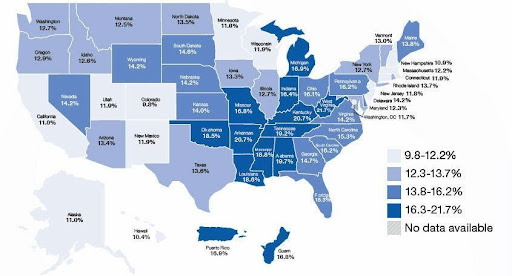
American Heart Month: More than a Celebration, a Great Reminder to Take Care of #OurHearts
Celebrated every February, American Heart Month serves as a great reminder to individuals about the importance of taking care of our hearts, at all stages of life.
Heart disease is the leading cause of death in the United States and a condition that is highly affecting the elderly population. Nearly 650,000 Americans die from heart disease each year and 1 in 9 adults (about 11%) have been diagnosed with heart disease (source).
 Research from the National Association of Chronic Disease Directors and CDC revealed that while adults are living longer, diseases of the heart and circulatory vessels are prevalent in the growing population of older adults. Some factors that affect an individual’s ability to function and manage their disease well include comorbidities, along with cognition, sleep, physical balance, and strength.
Research from the National Association of Chronic Disease Directors and CDC revealed that while adults are living longer, diseases of the heart and circulatory vessels are prevalent in the growing population of older adults. Some factors that affect an individual’s ability to function and manage their disease well include comorbidities, along with cognition, sleep, physical balance, and strength.
According to the brief, Coronary Heart Disease, Myocardial Infarction, and Stroke–A Public Health Issue, 14.2% of adults aged 45 years and older reported having coronary heart disease (CHD), a stroke, or both. Also, 9.6% of adults aged 45 to 64 years reported being diagnosed with CHD, or a stroke, or both compared with 21.7% of adults aged 65 years and older.

Image: Adults Aged 45 years and Older Who Reported Having Had Coronary Heart Disease, or a Stroke, or Both
When it comes to heart health, everyone needs to take steps to ensure a healthy lifestyle and quality of life. Check out a few tips to help your heart and the heart of your loved ones:
Self-Care:
Get a daily dose of physical activity.
Cook meals that are low in sodium and unhealthy fats.
Take your medications as prescribed and keep your medical appointments.
Sleep 7-8 hours a night.
Manage stress through meditation, yoga, a warm bath or other calming activities.
Try to maintain a healthy weight.
Technology:
Use a wearable device that measures steps, heart rate, and sleep.
Use an at-home blood pressure, blood sugar and heart rate monitor.
Search online activity and healthy eating planners, like these from health.gov and MyPlate.gov.
Support System:
Even if it’s virtual, connecting with friends or family for support can make self-care easier and even more effective. Research shows that having positive, close relationships and feeling connected to others helps our blood pressure, weight, overall health, and more.
By understanding the importance of cardiovascular health and how everyday activities can make an impact, we can ensure that, together, we are taking care of our hearts.
For more helpful tools and resources, check out the links below:
Resources for Caregivers
About American Heart Month: Ways to Get Involved
Heart Health Resources
Covid-19 and the Heart
Heart Disease: It Can Happen at Any Age
Heart Health Fact Sheets